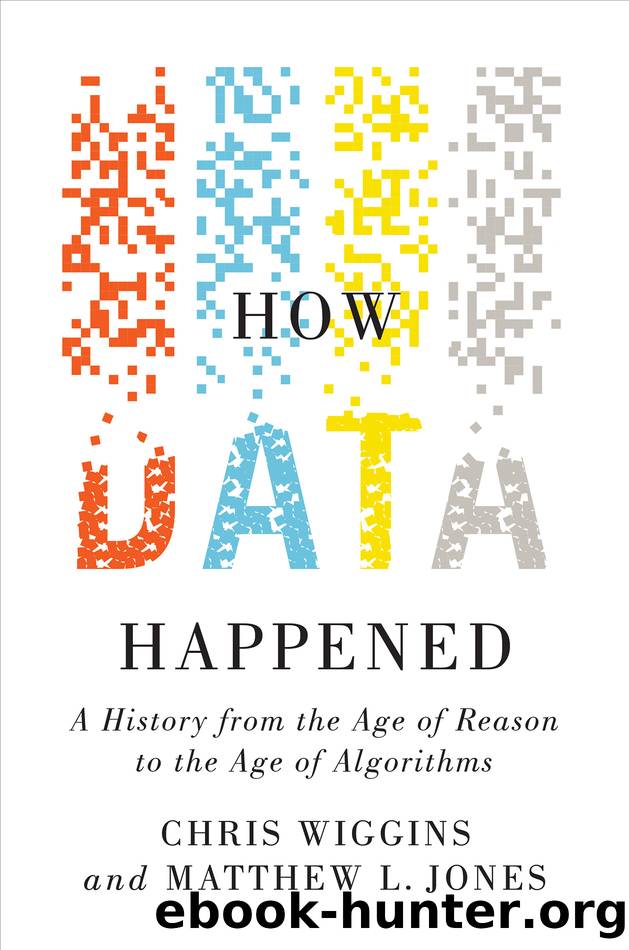How Data Happened by Unknown

Author:Unknown
Language: eng
Format: epub
Tags: Epub3
Publisher: W. W. Norton & Company
âData Analysis,â 1960sâ1990s
In 1974 the PrincetonâBell Labs mathematician John Tukey agreed to speak at the National Security Agency about âexploratory data analysis,â asking that the agency provide â2 screens and 2 projectors for large transparencies.â8 Long a scientific advisor to the NSA following his involvement with cryptography during World War II, Tukey had, since the 1940s, been creating new tools for exploring data, large and small, using all manner of statistical and graphical methods. Initially focused on paper tools for exploring data, he was at the forefront of the move to computers for graphing and analyzing data. Twenty-five years before, NSAâs Kullback had invited Tukey to a âsymposium on the general problem of data storage and retrievalââbased in part on Tukeyâs recommendation that the NSA look into the problem.9 The symposium was to consider what were the data storage and retrieval issues in generalâand what were those particularly to the NSA.10
Less important than the still-classified work Tukey did were the attitudes toward statistics and data he encouraged within the NSAâand within the unclassified world. Tukey worked for decades to transform the practical statistical work on large data sets of the war into far more general use toolsetsâand mindsets. In his career, he worked on everything from the census to missiles. The tools whose creation he encouraged and the graphical techniques he advocated such as the box-plot saturate contemporary data practices, including middle school standardized exams.
Informed by the large-scale data analysis needed during World War II, Tukey provided a programmatic statement of a changed approach to data and sought to make tools to realize it. In a 1962 manifesto, Tukey called for a new approach he dubbed âdata analysisâ that would be dedicated as much to discovery as to confirmation:
Data analysis, and the parts of statistics which adhere to it, must then take on the characteristics of a science rather than those of mathematics, specifically:
1. Data analysis must seek for scope and usefulness rather than security.
2. Data analysis must be willing to err moderately often in order that inadequate evidence shall more often suggest the right answer.
3. Data analysis must use mathematical argument and mathematical results as bases for judgment rather than as bases for proofs or stamps of validity.11
Download
This site does not store any files on its server. We only index and link to content provided by other sites. Please contact the content providers to delete copyright contents if any and email us, we'll remove relevant links or contents immediately.
Selective Oxidation Catalysts Obtained by the Immobilization of Iron (III) Porphyrins on Layered Hydroxide Salts by Fernando Wypych Shirley Nakagaki & Guilherme Sippel Machado(319)
How Data Happened by Unknown(314)
Introduction to Social Work Practice : A Practical Workbook by Herschel Knapp(311)
Global Health Governance and Commercialisation of Public Health in India by Anuj Kapilashrami Rama V. Baru(244)
Unmasked by Emily Mendenhall(205)
Curing Cancerphobia by David Ropeik(197)
The Pandemic Divide by Gwendolyn L. Wright Lucas Hubbard and William A. Darity Jr(191)
Restoring Quality Health Care by Scott W. Atlas(186)
Feminist Global Health Security by Clare Wenham(180)
Transforming Health Care Scheduling and Access: Getting to Now by Gary Kaplan(179)
FALSE PANDEMICS: ARGUMENTS AGAINST THE RULE OF FEAR by Wolfgang Wodarg(175)
Oversight and Review of Clinical Gene Transfer Protocols: Assessing the Role of the Recombinant DNA Advisory Committee by Rebecca N. Koehler(168)
The Making of a Pandemic: Social, Political, and Psychological Perspectives on Covid-19 by John Ehrenreich(162)
Insane Society: A Sociology of Mental Health by Peter Morrall(159)
Psychosocial Interventions for Mental and Substance Use Disorders: A Framework for Establishing Evidence-Based Standards by Mary Jane England(158)
Risk Communication and Infectious Diseases in an Age of Digital Media by Anat Gesser-Edelsburg Yaffa Shir-Raz(157)
Pandemic India by Arnold David;(157)
The Metropolitan Academic Medical Center by David E. Rogers Eli Ginzberg(155)
Into Africa, Out of Academia by Kwan Kew Lai(148)
